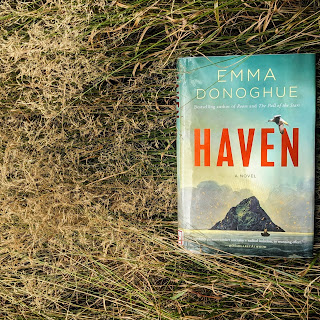Trish and Sophia Talk Books: Haven by Emma Donoghue
Trish and Sophia Talk Books
An occasional collaboration in which mom Trish and twenty-something medieval studies major daughter Sophia read and discuss books!
Review: Haven by Emma Donoghue
Harper Collins (2022)
Our Quick Take: This is a quiet, contemplative story of big, noisy ideas that gives the reader time to examine the nature of faith.
***
Trish: One thing that I enjoy about summer is that Sophia is off from school and she has time to read with me. Choosing a book, acquiring two copies and then cracking the spines and diving in as a twosome is a great feeling. We chat as we go, though she is a faster reader than me, and I’m perpetually playing catch-up.
I’d had Haven by Emma Donoghue on my radar for a few reasons. I’m always searching up medieval lit for Sophia, and I’d found Haven on a list as an early medieval period piece dealing with monks who set out to found a monastery on a far-flung island off the coast of Ireland. I didn’t purchase it at the time, but then came across a copy in an LFL, and picked it up. Clearly, this was a must-read for us. Bonus points for this being our first time reading Donoghue, a Canadian-Irish writer. It was high time we gave one of her books a go.
Sophia: Haven tells the story of visionary monk Artt, who has seen God’s will in a dream: that he and fellow monks Trian, a young enthusiastic man who’s skilled at fishing hunting; and Cormac, older, a bit wiser and great at building things must set sail for a remote island off the coast of Ireland and found a monastic mission.
Trish: As I started reading, I imagined how the plot would unfold. The comfort of belief, the creeping doubt that surely must come, and the all-too-human turning on one another in the face of looming disaster. This is not a spoiler, this is how I thought things would play out from the beginning. I expected this might be a fast-paced, action-packed spiral into chaos.
Sophia: What I enjoyed about this book was that it wasn't a fast-paced action novel! I thought that the slow, relaxed yet ominous pacing was much more effective, especially for a book about the ultimate slow-living profession: monks. It mirrored the mentalities and actions of the main characters, and the leisurely pace actually helped ramp up the suspense and unease of the book. Donoghue slowly added small bits of peril into the plot that kept piling up until they reached a boiling point, and I think for the type of book she was writing, this style was much more effective.
Trish: I totally agree! If it’s an act of faith to set out in search of this island, then Artt has faith to spare. Cormac and Trian have faith in God and in Artt, as God’s instrument. Instead of spinning out as a rapid descent into something dark, the novel was a slow, meditative journey into questioning and doubt. I could see the deep and abiding comfort of a world where God is in charge, and faith meant some peace of mind, even acceptance of a negative outcome. But the monks are still human, and the slow realisation that their faith in Artt is perhaps misplaced, was interesting to witness.
After leaving the monastery, the trio paddles down the river to the ocean. There are lots of islands, but none is the right one, according to Artt. Too close to civilization. On the open ocean, adrift for the most part, Trian and Cormac get an inkling that Artt’s plan is not concrete, rather more of a hazy vision.
“'The island in your dream, Father.’ Trian’s peering into the fog. ‘May I ask, what did it look like?’And this is just as they are getting started.
The Prior sounds nettled. ‘It was not drawn like a picture, or illuminated in colours. It was more the idea of an island.’
‘Somewhere out there in the ocean.” Cormac means that as confirmation, but it comes out almost sceptical.
‘It’s out there, all right,’ the Prior insists. ‘Since God has given me–given us three–this holy mission of serving him in absolute seclusion, he will have prepared a fit place for us’...
This is sounding to Cormac less and less like an actual island. As if the three of them have stepped out of everyday life into a magical boat, and their journey is a fable.”
I liked the descriptions of nature. The island is uninhabited, remote and a very harsh natural environment. It’s become home for tons of species of birds, and sea life also takes a prominent place. Of course, the birds and fish are also food sources…it can get a bit grisly.
I read later that the island they built their outpost on which they called Great Skellig is based on Skellig Michael, which does have a history of monastic dwellings, and is now famous for having been in a Star Wars movie. Tourism is limited because of ecological issues.
Sophia: There are also, I believe, a few medieval religious remains on Skellig Michael and similar islands. I really liked how Donoghue incorporated actual medieval history into this book. It made me so happy as a Medieval Studies student.
Trish: Overall, I found reading Haven a pleasure. It was slow and leisurely but that gave me time to think about these themes of faith and doubt as I went along. Watching the monks’ constant struggle to survive–and their impressive problem solving– in a harsh environment was enough to keep the book from falling into overly intellectual territory. It leaves me positively anticipating my next Donoghue read.




Comments
Post a Comment